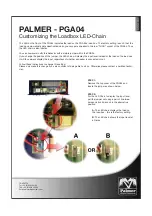
Instruction Manual
D103643X012
DFA Desuperheater
August 2013
6
Figure 3. Fisher DFA Dimensions (also see tables 4 and 5)
MOUNTING FLANGE
(SAME SIZE & PRESSURE
CLASS AS BODY FLANGE)
F
E
B
T
D
NOZZLE APPLICATION
AVAILABLE NOZZLE CONFIGURATIONS
FLOW
DIRECTION
FLOW
DIRECTION
Nozzle Maintenance and Replacement
If it is necessary to remove the DFA desuperheater from service, take note of the following warning.
WARNING
Avoid personal injury or damage to property from sudden release of pressure or uncontrolled process fluid. Before starting
disassembly:
D
Always wear protective gloves, clothing, and eyewear when performing any maintenance operations to avoid personal
injury.
D
Isolate the desuperheater from process pressure. Relieve process pressure on both sides of the desuperheater. Drain the
process media from both sides of the desuperheater.
D
Use lock-out procedures to be sure that the above measures stay in effect while you work on the equipment.
D
Check with your process or safety engineer for any additional measures that must be taken to protect against process
media.
When subjected to normal operating conditions, it is possible that wear, blockage, and/or weld fatigue will occur to
the desuperheater body or nozzle assembly. During regularly scheduled maintenance, visually inspect the
desuperheater welds for cracks and inspect nozzles for wear and blockage. Your local Emerson Process Management
Instrument and Valve Services office can help to determine the extent of weld fatigue and the correct course of action.
Poor performing nozzles or nozzle failure is typically caused by wear, corrosion, erosion, and/or blockage. The
following instruction will help to determine if any of these problems are present and provide a recommended course
of action for each.
Note
For optimal performance, nozzles should be inspected every 18-24 months and replaced every 24-36 months.






























